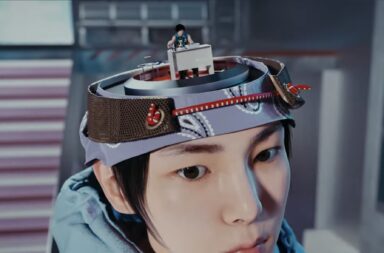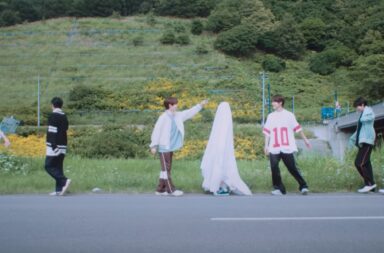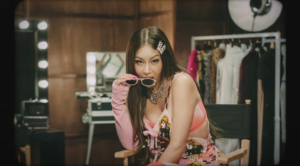
Jessi has been on a roll. From playing a prominent role in the third season of Sixth Sense to her last successful release, “Cold Blooded”, with the talented dancers from Street Woman Fighter, Jessi is back six months later with her latest single, “Zoom”.
“Zoom” is absolutely Jessi-esque. It is fierce, bold, and unabashed. In typical Jessi fashion, while it is devoid of a storyline, Jessi’s superb facial expressions, coupled with her use of minimal sets and props, and simple yet catchy choreography make it a neat MV. Even when Jessi is paired with La Chica from Street Woman Fighter, the two groups of charismatic women complement each other perfectly, especially with a choreography that is simple but straight to the point. While Jessi has more elaborate setups, such as the one where she sits at the table with La Chica and the one where she is shown backstage in her dressing room supposedly before her performance, the simpler sets, strangely, help Jessi stand out more as they emphasize her charisma, cheeky expressions, and energy that she is known for.
“Zoom”, as Jessi explains, is about how “We cannot live without our smartphones. We want to get photographed and get attention from others. It’s a sad reality.” As it posits, we live more in the world of social media and less so in reality. Simply put, it is about how our widespread use of social media continues to blur the line between the virtual world and reality, and how social media creates a distorted sense of reality.
In fact, “Zoom” depicts a very 21st-century mentality of “If you didn’t post about it on social media, did it really happen?”. As Jessi so aptly encapsulates the root of this problem in the following lines: “We love to pose and capture moments all over the world”, “We love and live for attention, that’s no question”. In particular, Jessi’s facial expressions (or lack thereof) perfectly encapsulate this phenomenon. At one point, sitting at the table with La Chica, who is preoccupied with taking pictures and not paying attention to one another, Jessi, on the other hand, is bothered by how everyone else is solely focused on what they should post on social media. Her blank expression, as it appears, indicates the futility of living a lavish lifestyle when genuine human connection is absent.
Jessi contrasts her life behind and in front of the camera with the varied sets at another point. As “Zoom” begins with Jessi posing for the camera, she subsequently appears in a black and white scene as racks of clothing move past her, implying that she is dissatisfied with the material goods that she can have as a celebrity, a message that is reinforced by the scene’s black and white filter. Jessi’s world appears to still be plain and she still feels dissatisfied, as her life as a celebrity has heavily revolved around social media. Similarly, as Jessi admits in an interview,
As I’m often put under the spotlight, there are times when I want to escape and hide from it. But when I’m actually away from it, I suddenly want the attention back on me. It shows the reality that although we all want the attention, we can’t really say it out loud.
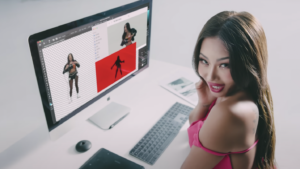
Another major issue Jessi criticizes is how social media promotes unrealistic bodily expectations. As she believes, social media fosters an unhealthy culture in which users scrutinize and compare themselves to other users, disempowering rather than empowering them. As the chorus goes:
I see you lookin’ at my P-I-C (I know)
You can stretch it, stretch it, stretch, stretch it out
I know you like what you see (Ayy)
Zoom in (Uh-huh), zoom out (Okay)
Zoom in (Uh-huh), zoom out (Okay)
Zoom in (Uh-huh), zoom out (Okay)
Baby, shocked starin’ like a hawk gawkin’ at me, ow
Jessi condemns the unhealthy act of zooming in and out of other people’s images on social media, comparing it to a hawk swooping down on its target, ready to pounce, that is, to criticize them, “Always talkin’ shit”. Users “screenshot, archive on the cellie” to ridicule users who have blatantly edited their images to make their “ass fat” and have “no belly” as a photoshopped image of Jessi titled “Insta picture” flashes on the screen. This relates to the age-old concern that social media has a detrimental effect on teenagers and young people’s perceptions of their bodies, which has only grown more problematic as the average age of social media users has decreased year after year.
The actual problem with this type of behaviour is that it arises from society’s fixation with letting likes on social media determine their self-worth, with some going to the extent of photoshopping their photos to meet stereotypical beauty standards. Though Jessi mentions photoshopping, this Vox comic illustrates a similar idea. With social media harbouring a high degree of body dissatisfaction, young women end up treating their bodies like commodities when they change themselves physically over time, whether through cosmetic procedures, disordered eating, or excessive exercising.
Additionally, with social media, “flexing” becomes second nature for some. As Jessi points out, people who do so frequently do so at the expense of someone else’s money, in this case, his mother’s.
It’s funny how you always talking money
But always playin’ a dummy
Youse a bummy
Beggin’ yo’ mummy for money, ha
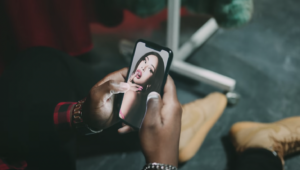
Specific to Korea, this is related to a growing phenomenon where teenagers purchase luxury items to flex on social media. And as many adults have correctly identified, teenagers absolutely do not need luxury items as it fosters materialism from a young age. As “Zoom” is suggesting, flexing is nothing more than an odd, toxic, and very expensive form of self-expression to falsely reinforce one’s better status than others. In truth, the desire to constantly flex is founded on materialism in order to stay relevant, as status symbols take precedence over authenticity.
As a celebrity, Jessi is always pressured to present herself in the best possible light. However, Jessi, who has openly admitted to having many plastic procedures, has ironically fallen victim to the dangers of social media as well, especially by altering her body to fit the American beauty standards. In this aspect, while I would hesitate to call “Zoom” a complex song, it is undeniably one that mirrors modern society, one that many of us have experienced at least once in our lives.
(Korean Herald[1][2], Korea Times, Science Direct, Vox. YouTube[1]. Images via P Nation. Lyrics via Genius.)

